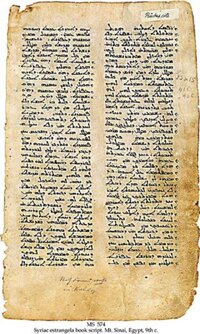 Aramaic is a Semitic language with a 3,000-year history. It has been the language of administration of empires and the language of divine worship. It is the original language of large sections of the biblical books of Daniel and Ezra, and is the main language of the Talmud. Aramaic is believed to have been the native language of Jesus. In the following passage, spoken by Jesus while being crucified, "Eloi, Eloi, lama sabachthani" is Aramaic. Matthew 27:46 has a direct parallel in Psalm 22 (written by David nearly 1,000 years before the birth of Jesus):
Aramaic is a Semitic language with a 3,000-year history. It has been the language of administration of empires and the language of divine worship. It is the original language of large sections of the biblical books of Daniel and Ezra, and is the main language of the Talmud. Aramaic is believed to have been the native language of Jesus. In the following passage, spoken by Jesus while being crucified, "Eloi, Eloi, lama sabachthani" is Aramaic. Matthew 27:46 has a direct parallel in Psalm 22 (written by David nearly 1,000 years before the birth of Jesus): About the ninth hour Jesus cried out in a loud voice, "Eloi, Eloi, lama sabachthani?"—which means, "My God, my God, why have you forsaken me?" -Matthew 27:46
Even at the threshold of death, Jesus quotes scripture (see Psalm 22:1).
It is confessed that David was a type of Christ, and that many passages of the Psalms, though literally understood of David, yet had a further and mystical reference to Christ. But there are some other passages, which were directly, and immediately intended for, and are properly to be understood of the Messiah; though withal there may be some respect and allusion to the state of the penman himself. And this seems to be the state of this psalm, which is understood of the Messiah, by the Hebrew doctors themselves, and by Christ himself and by his apostles. And there are many passages in it, which were literally accomplished in him, and cannot be understood of any other. In this psalm David speaks of the humiliation of Christ, ver. 1 - 21. Of the exaltation of Christ, ver. 22 - 31. To the chief musician upon Aijeleth Shahar, A psalm of David.Christian Classics Ethereal Library of Calvin College.
John Wesley's notes on Psalm 22
More...


No comments:
Post a Comment